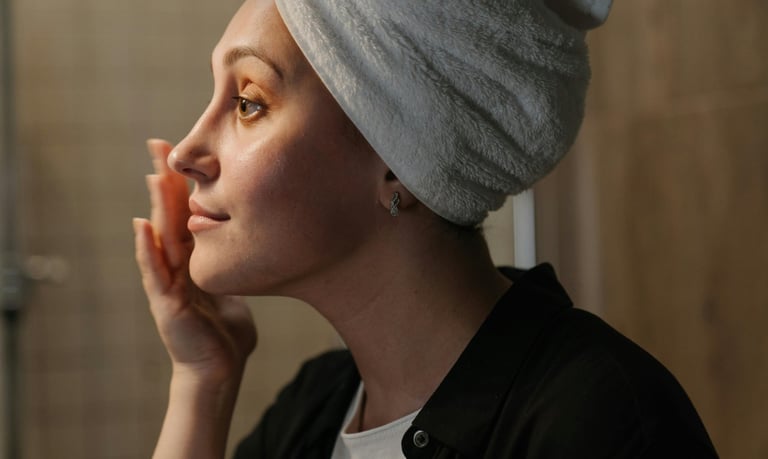Collagen and Youthful Skin: The Science Behind Firmness
BEAUTYSKINCARE


When collagen levels are high, your skin looks smooth, taut, and luminous. As it fades, however, the skin becomes thinner, drier, and more prone to fine lines and sagging.
Every glowing face owes its vitality to collagen. This unsung protein keeps cheeks plump, jawlines sculpted, and fine lines from settling in too early. Around your late 20s, collagen production quietly slows. You might not notice it right away, but one day you’ll catch your reflection and wonder: Is it the lighting, or has something changed?
Luckily, science can lend a hand. While you can’t stop time, you can help your skin stay resilient, radiant, and strong.
What is collagen?
Collagen is your skin’s support system. It makes up about 75% of your skin’s dry weight, giving it structure and bounce. When collagen levels are high, your skin looks smooth, taut, and luminous. As it fades, however, the skin becomes thinner, drier, and more prone to fine lines and sagging.
That said, it doesn’t disappear overnight. Instead, collagen fades gradually due to natural aging and certain lifestyle habits. Here’s what’s working against it:
Time and hormones
After 25, collagen production drops by about 1% each year. During menopause, levels can plummet up to 30% in just five years. It’s not a flaw—it’s part of being human.
UV exposure
UVA rays penetrate deep into the skin and break down collagen fibers. Even on cloudy days or through windows, UV damage is real. Skipping your SPF? That’s an open invitation for collagen loss.
Stress and inflammation
Chronic stress, various forms of microstress, pollution, and poor sleep fuel inflammation, which, in turn, weakens collagen and slows its repair. Your skin isn’t being lazy, it’s just under a lot of pressure.
Sugar
Excess sugar leads to glycation, where sugar molecules bind to collagen fibers, making them stiff and brittle. This damage can lead to visible sagging and loss of elasticity.
Lifestyle habits
Smoking, dehydration, alcohol, poor nutrition, and even harsh skincare routines can all accelerate collagen breakdown.
Can you boost collagen? Here’s what science says
Sure, you can’t turn back time, but you can nudge your skin to behave a little more youthfully. That’s where smart skincare comes in. While no cream can replace lost collagen overnight, certain ingredients have been shown to inspire your skin to get back to work.
Retinoids
Retinoids are the overachievers of the skincare world and for good reason. These vitamin A derivatives speed up cell turnover, stimulate fibroblasts (the cells that make collagen), and even reduce the enzymes that break collagen down. When introducing retinoids to your skincare routine, start gradually and moisturize well. This powerful ingredient can dry the skin and cause irritation.
Vitamin C
This isn't just your morning immunity booster. Vitamin C is critical for the actual formation of collagen. That’s because it helps the skin produce new collagen fibers. Topical vitamin C also helps fight off free radicals from pollution and UV exposure, two major culprits in collagen breakdown. Here’s a pro tip: look for serums with at least 10% to 20% L-ascorbic acid and store them away from light to keep them potent.
Bakuchiol
If your skin is too sensitive for retinol, bakuchiol might be your new favorite. This botanical extract mimics many of retinol’s collagen-boosting effects but is gentler and less likely to cause irritation. Studies suggest it reduces fine lines, improves skin elasticity, and even helps fade sun spots.
Aloe Vera
Yes, your childhood sunburn savior is having a moment and it deserves it. A Korean clinical study found that women who took aloe vera supplements showed increased Type I procollagen levels and visible improvements in skin elasticity. Topically, aloe hydrates deeply and creates a calm environment for collagen to thrive.
A Collagen‑Conscious Skincare Routine
You don’t need a dozen steps, just a focused routine with ingredients proven to support collagen.
Morning Routine
Vitamin C Serums
TruSkin Vitamin C Serum – Contains vitamin C, vitamin E, and hyaluronic acid to brighten and support collagen.
La Roche-Posay Pure 12% Vitamin C Face Serum – Dermatologist-tested with 12% pure vitamin C plus hyaluronic acid and salicylic acid for smoother texture.
Obagi Professional-C Serum 15% – Clinical-grade vitamin C for antioxidant protection and wrinkle reduction.
Antioxidant Moisturizers
Neutrogena Hydro Boost Gel-Cream with Hyaluronic Acid – Hydrates and helps maintain skin elasticity.
Youth To The People Superfood Air-Whip Moisture Cream – Loaded with antioxidants from green tea, spinach, and kale.
Glow Recipe Plum Plump Hyaluronic Cream – Korean face cream formulated with polyglutamic peptides to reduce wrinkles.
Sunscreen
EltaMD UV Clear Broad-Spectrum SPF 46 Face Sunscreen – Lightweight and great for sensitive or acne-prone skin.
Supergoop! Unseen Sunscreen SPF 40 – A makeup-friendly gel that protects without residue.
La Roche-Posay Anthelios Melt-in Milk Sunscreen SPF 100 – Extra protection with antioxidant-rich formula.
Evening Routine
Retinoid Serums
CeraVe Resurfacing Retinol Serum – Contains encapsulated retinol and ceramides to support the skin barrier.
Avène Retrinal 0.1% Intensive Multi-Corrective Cream – Uses retinaldehyde, which is reported to be more powerful than retinol but also milder.
The Ordinary Granactive Retinoid 2% Emulsion – A creamy serum that improves skin texture and reduces the appearance of fine lines.
Bakuchiol Products
Herbivore Bakuchiol Retinol Alternative Smoothing Serum – Lightweight, plant-based serum for nighttime renewal.
Olehenriksen Goodnight Glow Bakuchiol Sleeping Crème – Smooths fine lines and improves dark spots.
Soothing Moisturizers
First Aid Beauty Ultra Repair Cream – Rich hydration with colloidal oatmeal.
La Roche-Posay Cicaplast Balm B5 – Calms and repairs with panthenol, shea butter, and centella asiatica.
Paula’s Choice Omega+ Complex Moisturizer – Nourishes with omega fatty acids and vitamin C.
Aloe Vera Gel
Seven Minerals Organic Aloe Vera Gel – Pure, cold-pressed aloe with no sticky residue.
Amara Organics Aloe Vera Gel – Aloe vera moisturizer for the face, body, and hair.
At the same time, you can also try an overnight collagen mask to support your skin's hydration.
This isn’t about turning back the clock. It’s about helping your skin stay firm, supported, and beautifully alive on your terms. With the right ingredients, a solid routine, and a little patience, your collagen can keep doing what it does best: helping you look like your healthiest, most radiant self.
Disclaimer
The advice and product recommendations in this article are for general guidance and inspiration. Since skincare is highly personal, results may vary depending on your individual skin type and concerns. Please remember to patch test new products before use to ensure compatibility with your skin. We also recommend consulting with a dermatologist or skincare expert before trying new products, especially if you have specific skin conditions. This article may also contain affiliate links, meaning we may earn a small commission if you make a purchase through them at no cost to you. We are also part of the Amazon Associates program.
